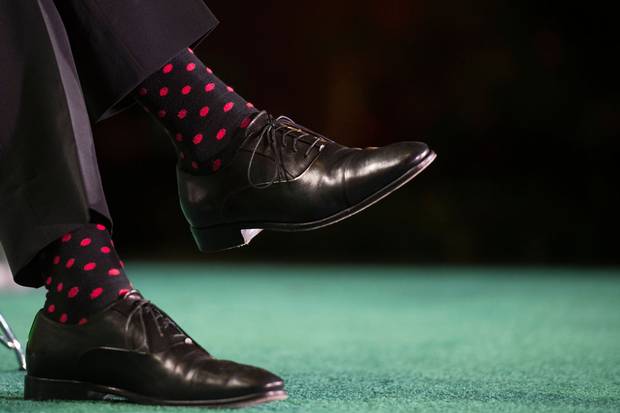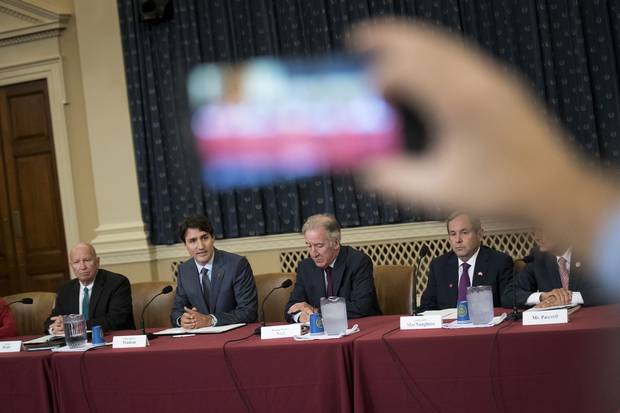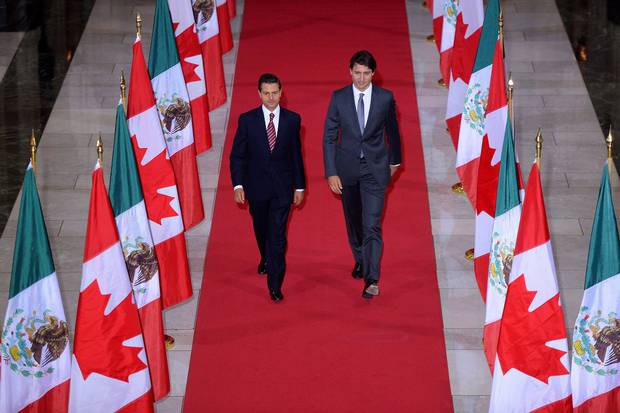The basics
- Prime Minister Justin Trudeau met U.S. President Donald Trump at the White House on Wednesday as the fourth round of talks on the new North American free-trade agreement began.
- In the Oval Office with Mr. Trudeau, Mr. Trump told reporters that if he can’t make a deal on NAFTA it would be terminated, adding that he could envision a deal with Canada that didn’t include Mexico.
- After his visit to the White House, Mr. Trudeau held a press conference where he continued to defend the need to modernize NAFTA. He acknowledged that NAFTA talks are often challenging and that “we have to be ready for anything, and we are. We’re taking this very seriously.”
- Earlier in the day, Mr. Trudeau and Foreign Affairs Minister Chrystia Freeland were welcomed to a meeting of the House of Representatives’ committee on ways and means, which has a powerful role in approving or sinking U.S. trade deals.
- The committee’s chairman, Kevin Brady, told Mr. Trudeau he wants NAFTA to succeed but the new deal should give U.S. dairy producers more access to the Canadian market.
- U.S. Commerce Secretary Wilbur Ross said Wednesday evening at an event with former Canadian industry minister James Moore that NAFTA talks had so far mostly focused on easier topics and will now shift to tackling harder matters. He added that the new NAFTA will have 28 chapters.
- Mr. Trump was dividing his day between the Trudeau visit and a rally in Harrisburg, Pa., to promote his tax-reform plan before an audience of truckers.
- NAFTA talks get under way on Wednesday in Arlington, Va., and go until next Tuesday. Originally scheduled for five days, the talks were extended to seven to resolve scheduling conflicts by the major participants, the Prime Minister’s Office said. Here’s a primer on the talks and what’s at stake.
- After his visit to Washington, Mr. Trudeau heads to Mexico City on Thursday for his first official visit to the country.
The visit
Mr. Trudeau and his wife, Sophie Grégoire Trudeau, arrived in Washington on Tuesday afternoon. The first order of business was a gala at Fortune magazine's Most Powerful Women summit.

Mr. Trudeau and Ms. Grégoire Trudeau pose for a selfie with young students at the Fortune summit at Washington’s Smithsonian American Art Museum.
SEAN KILPATRICK/THE CANADIAN PRESS
Foreign Affairs Minister Chrystia Freeland also spoke at the summit ahead of the Prime Minister's arrival. Asked about the policy feud between Mr. Trump and Republican Senator Bob Corker – who says the President's provocations of other countries risk igniting "World War III" – Ms. Freeland said that Canada faces one of its most trying periods in foreign policy:
I think this is probably the most uncertain moment in international relations since the end of the Second World War. [The postwar order] has really worked. With time it has embraced more and more people into a peaceful, prosperous world. It's been great. And that order is starting to fracture. As a result, we're seeing tensions in lots of different places.

Chrystia Freeland speaks at Tuesday’s Fortune summit.
PAUL MORIGI/GETTY IMAGES FOR FORTUNE
Later that evening, Mr. Trudeau spoke at the summit before a divided crowd: On the one hand, progressive business leaders who groaned or booed when the moderator brought up Mr. Trump's name, and on the other, the President's daughter, Ivanka.

Ivanka Trump watches Mr. Trudeau’s keynote speech at the Smithsonian American Art Museum.
SAIT SERKAN GURBUZ/ASSOCIATED PRESS
Mr. Trudeau spoke about his hopes to persuade Mr. Trump to include protections for gender equality, the environment and labour in a new NAFTA, and was hopeful Canada and the Trump administration could find common ground:
You look for things where you find common ground and you look for ways to work together to improve the outcomes not just for your own country, but for both your countries. Canada and the United States are tremendously intertwined. And when one does well, the other does well, and when we both do well together, I think we're unstoppable.
Asked at the women's summit about his penchant for colourful socks, Mr. Trudeau said they could sometimes be distracting, but that the distraction could be useful in conversation. "I just used up five seconds of conversation about Trump," he joked.

The Prime Minister’s socks on Tuesday night.
ANDREW CABALLERO-REYNOLDS/AFP/GETTY IMAGES
On Wednesday morning, after attending a roundtable discussion on empowering women and girls, Mr. Trudeau and Ms. Freeland were welcomed to the House of Representatives' committee on ways and means, one of two bodies of U.S. lawmakers helping negotiators put forward American positions on trade. Kevin Brady, the committee's Republican chairman, welcomed Mr. Trudeau but told him Canada and the U.S. still have issues to work out at the NAFTA talks, including dairy supply management:
Our committee, who you are with today, has constitutional responsibility for trade. It's dedicated to ensuring these negotiations are successful. To do that, we need to make progress on issues such as customs barriers, border, intellectual property protection, and greater market access for U.S. dairy producers.

Republican congressman Kevin Brady, Mr. Trudeau, Democratic congressman Richard Neal and Canadian ambassador to the United States David MacNaughton attend a meeting with the House ways and Means committee.
DREW ANGERER/GETTY IMAGES
Mr. Trump and first lady Melania Trump welcomed the Trudeaus to the White House shortly before 2 p.m. Speaking to reporters minutes later in the Oval Office, Mr. Trump was ambivalent about the deal's future, but repeated earlier threats that it would be terminated if no agreement is reached:
We’ll see if we can do the kind of changes that we need. We have to protect our workers, and in all fairness, the prime minister wants to protect Canada and his people also. It has to be fair to both countries.
Trudeau arrives at White House for meeting with Donald Trump
After his visit to the White House, Mr. Trudeau held a press conference atop the Canadian embassy, overlooking the Capitol, where he continued to defend the need to modernize NAFTA. The Prime Minister acknowledged that the circumstances of NAFTA talks are often challenging and "we have to be ready for anything, and we are. We're taking this very seriously."
My optimism towards NAFTA, towards a renegotiation, isn’t based on personality or reading political tea leaves. My optimism is based on the fact that I know how good NAFTA has been for millions of citizens.
Trudeau remains optimistic for a positive outcome to NAFTA negotiations
What was on Trudeau's mind
NAFTA
After three rounds renegotiating the decades-old trilateral deal, Canadian and Mexican officials are still mystified by what the Trump administration really wants. During last month's talks in Ottawa, The Globe reported – citing high-level sources connected with the talks – that the American representatives are ill-prepared and that infighting between the U.S. Trade Representative and Commerce Secretary are complicating the talks. Keeping the negotiations running smoothly without giving in to the President's protectionism has been a challenge for the Canadians, and Mr. Trudeau's visit to Washington is part of that balancing act.
Bombardier
The Canada-U.S. trade relationship has suffered new blows recently as the Trump administration has hit Canadian manufacturer Bombardier with punishing tariffs on its C Series airliner. Bombardier's U.S. competitor, Boeing, alleges that Bombardier gets unfair subsidies from the Canadian and British governments, and the U.S. Commerce Department is responding with proposed duties of nearly 220 per cent.
What was on Trump's mind
Tillerson and the 'moron' meeting
Simmering tensions between Mr. Trump and Rex Tillerson, his Secretary of State, spilled into the open last week when NBC News reported that Mr. Tillerson described Mr. Trump as a "moron" to associates after a highly classified July briefing. On Wednesday morning, NBC explained further that, at the briefing, Mr. Trump asked for a tenfold increase in U.S. nuclear stockpiles, according to unnamed officials present at the time. This week, Mr. Trump challenged Mr. Tillerson to "compare IQ tests" with him, delivering a sharp-edged ribbing that pointed to real malice between the two men, but which the White House later insisted was only a joke.
Rex Tillerson never threatened to resign. This is Fake News put out by @NBCNews. Low news and reporting standards. No verification from me.
— Donald J. Trump (@realDonaldTrump) October 5, 2017
Corker & Co. and the tax agenda
Brewing unrest in the Republican Party ranks has taken much of Mr. Trump's attention because it could threaten his tax-reform agenda in a legislature where he can ill afford to lose any GOP legislators' votes. At the centre of the dispute is Senator Bob Corker of Tennessee, chairman of the Senate Foreign Relations Committee, who has said recently that Mr. Trump's advisers are guarding against "chaos"; that Mr. Trump could set the U.S. "on the path to World War III" with his provocations of other countries; and that the Trump White House is an "adult day care centre." Mr. Trump's Twitter invective against the senator has been heated in recent days. He is also revving up a cross-country tour to promote the tax-reform plan, visiting a rally with truckers in Harrisburg, Pa., soon after his White House meeting with Mr. Trudeau.
The Failing @nytimes set Liddle' Bob Corker up by recording his conversation. Was made to sound a fool, and that's what I am dealing with!
— Donald J. Trump (@realDonaldTrump) October 10, 2017
NFL
In the past few weeks, Mr. Trump and Vice-President Mike Pence have ramped up criticism of the National Football League over silent player protests during the national anthem. Players have been kneeling instead of standing during the anthem in protest against police brutality and killings of black Americans, but Mr. Trump has tried to reframe the issue as one of disrespect to troops and American patriotism. This past Sunday, Mr. Pence walked out of an NFL game in Indiana, his home state, after some players took the knee or locked arms.
It is about time that Roger Goodell of the NFL is finally demanding that all players STAND for our great National Anthem-RESPECT OUR COUNTRY
— Donald J. Trump (@realDonaldTrump) October 11, 2017
Iran
Mr. Trump, who has accused his predecessor Barack Obama of being too soft on Iran, is expected to announce a hardening of policy on the country this week, likely to include "decertifying" a landmark 2015 deal that lifted international sanctions in return for curbs on Tehran's nuclear program. Such a step would stop short of pulling out of the agreement, leaving that decision to Congress. Iran has kept up a steady drumbeat of hostile statements about the nuclear deal for days.
What will Trump do next to NAFTA?
Tensions are high over the NAFTA talks, with Mr. Trump signalling again that he considers unilateral withdrawal from the deal to be a valid strategy. In an interview with Forbes magazine published Monday, the President reiterated earlier threats to terminate NAFTA, also taking aim at the effectively dead Trans-Pacific Partnership between Canada, the United States and 10 other Pacific countries:
I happen to think that NAFTA will have to be terminated if we're going to make it good. Otherwise, I believe you can't negotiate a good deal ... . [The Trans-Pacific Partnership] would have been a large-scale version of NAFTA. It would have been a disaster. It's a great honor to have – I consider that a great accomplishment, stopping that. And there are many people that agree with me. I like bilateral deals.

SEAN KILPATRICK/THE CANADIAN PRESS
Next stop, Mexico
On Thursday, Mr. Trudeau goes from Washington to Mexico City, his first official visit to the country. Joined by Ms. Freeland and International Trade Minister François-Philippe Champagne, he'll meet with outgoing President Enrique Pena Nieto, pay his respects to victims of the recent Mexican earthquake and speak to the Mexican Senate on Friday.
With reports from The Canadian Press, Associated Press, Reuters and Globe staff
MORE FROM THE GLOBE AND MAIL










